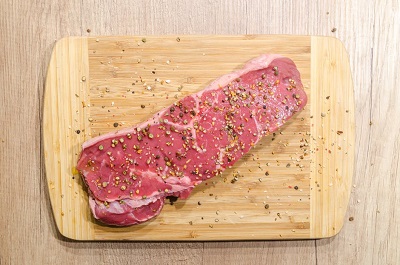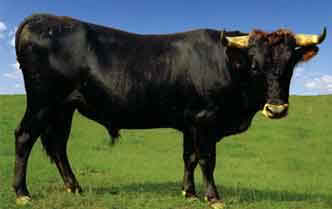Why Does My Beef Taste Like Grains
Does Grass-Fed Beef Taste Different?
back to Blog
Is there a difference between the taste of grass fed beef and grain fed beef? Learn about the grass fed beef taste in this guide.
The meat industry is the largest segment of U.S. agriculture. And meat-eaters love nothing more than a juicy steak! But do you think about what goes into your meat? Specifically, what the cows eat while they're still alive?
Many cows are fed a grain diet. However, cows are meant to eat grass.
Eating grain, specifically, corn and soy, is unnatural for cows. Grain-fed cows can further disturb humans; this study shows that cows are more susceptible to disease and bacteria when they eat a high-grain diet.
While a grass-fed diet is healthier and natural for cows, does grass-fed beef taste better?

Texture
Before we discuss the taste, let's discuss the texture.
The texture makes or breaks a steak. This is due to a process called marbling.
Marbling is the white streaks of fat inside of the meat. When you look at a raw steak, you can see the marbling. Grain-fed cattle have more marbling than grass-fed cattle.
So, which has a better texture? Traditionally, the marbling is considered a prime aspect of high-quality steak. Since grain-fed cattle have more marbling, grain-fed steaks are rated some of the highest grades compared to grass-fed.
Does this mean grain-fed is better than grass-fed?
Many people actually prefer the texture of grass-fed steak. That's because grass-fed beef is leaner and chewier. Though the fat helps give the steak its rich flavor and helps make the steak juicier, many steak eaters don't enjoy the fatty taste.
Which brings us to our point…
Does Grass-Fed Beef Taste Better?
The cow's diet ultimately affects the way it will taste. But this boils down to preference.
During the last few months of the cow's life, they're given a high-grain diet, consisting of corn, soy, corn by-products, and additional supplements. This helps the cow grow and increases marbling. The grains leave the meat with a sweeter taste.
Grass-fed cows eat a combination of grass and other forage available. They don't produce the fat that grain-fed cows produce but their muscles are leaner. Many describe the taste as meatier and even more similar to game meat.
Why Grass-Fed Beef Boasts a Superior Flavor
One of the reasons why many people think grass-fed beef has a superior flavor is because it tastes more natural. As stated previously, cows are supposed to eat grass. It helps them retain their health and their muscles stay lean.
While fat does provide a lot of the steak's flavor and texture, more fat doesn't necessarily equate to better-tasting steak.
A grass-fed diet improves the fat fibers hidden deep in the muscles. Grass-fed beef has more nutrients in the fat and muscle fibers, which we will discuss more in the next section.
But Grass-Fed Beef Is Healthier
Even with the grain-fed versus grass-fed debate, many people are opting for grass-fed beef. Why is that? The main reason is the health benefits.
First and foremost, there are fewer calories. Sure, we all love a bigger and fattier piece of steak. But when you eat that steak, you're consuming the extra fat and calories. Grass-fed steak is leaner, so you consume fewer calories per pound.
Grass-fed beef also has higher amounts of omega-3 fatty acids, which is an essential nutrient. It's been said grass-fed beef contains five times more omega-3 fatty acids as opposed to grain-fed beef.
In addition, grass-fed beef contains more conjugated linoleic acid (CLA), twice as many as grain-fed beef. CLA is another fatty acid that comes with health benefits.
Fat Versus Yummy Fat
As stated previously, fat gives steak its flavor. However, steak doesn't need copious amounts of fat. If anything, too much fat hinders the steak's texture, making it difficult to eat.
Instead, focus on yummy fat. This is what grass-fed steak provides over grain-fed steak. Grass-fed steak offers yummy fat rich with flavor. This is because of the nutrients found in the fat.
While grain-fed steak has more marbling and overall more fat, the fat is bland and causes the steak to have a chewier texture.
Look for Beta-Carotene
We mentioned some of the essential nutrients found in grass-fed beef, such as omega-3 fatty acids. But now, we'll discuss a nutrient you can see.
When looking at the grain-fed and grass-fed steak, the fat in grain-fed steak looks white while the fat on grass-fed steak looks like a rich yellow shade.
That's because of the nutrient beta-carotene. Beta-carotene is an antioxidant and is found in higher concentrations of grass-fed beef.
Beta-carotene naturally changes the pigment of food. For example, this antioxidant gives carrots its orange color. The more yellow the fat, the healthier the beef.
Other Factors to Consider
While grass-fed beef is healthier and generally tastes better, there are other factors to consider that affect the way your steak tastes.
The cut is a prime example. Certain cuts are fattier, tastier, and some beef eaters just prefer certain cuts over others. For example, if you don't like a lot of fat in your steak, choose a sirloin cap over a fattier cut.
Certain cuts, such as filet mignon, are also more nutritious. Other favorites, such as the New York Strip and rib-eye, are also tender and juicy.
The amount of time the beef ages also affects its flavor. Ideal aging allows enzymes to break down the muscle tissue. Beef is typically aged between a few days and even as long as several weeks to ensure it's aged properly.
The way you prepare and season the steak also depends on its taste. Cover the steak with kosher sea salt and let it rest for about an hour at room temperature before you cook it.
Flavor the steak with whatever you like — popular options include red wine, black pepper, and garlic powder.
Buy Grass-Fed Steak!
Does grass-fed beef taste better? Why don't you decide for yourself! Shop our grass-fed beef selection. We offer traditional steaks as well as beef patties, beef used for fajitas, and beef for brisket.


Source: https://www.leanandtenderbeef.com/Blog/Grass-Fed-Beef-Taste/
0 Response to "Why Does My Beef Taste Like Grains"
Postar um comentário